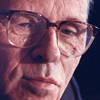Sakharov on His Intellectual Evolution
Physicist to the core, Sakharov was not born a humanitarian politician. According to his colleague Vitaly Ginzburg, Sakharov “was made of the material of which the greatest physicists are made.” Igor Tamm once remarked that his student “concentrates all his intellectual efforts on physics.”
The experience of building the most terrible of weapons transformed Sakharov’s life. The advent of nuclear energy meanwhile pressed all physicists to become more aware of the politics related to their physics. For Sakharov the weapons were a new empirical fact that he was required to meditate upon. Having done this thoroughly, he faced an old dilemma: “If not me, then who?” This led him to transcend the boundaries of physics as a science. In his research work, following his intuition as a physicist, Sakharov had broken through the limits of accepted knowledge on several occasions – in 1948 when he suggested a new principle for a thermonuclear device, in 1950 when he proposed the idea of the Tokamak thermonuclear reactor, and in 1967 when he suggested an explanation for the mysterious asymmetry of matter in the Universe. The same intuition guided him in writing his 1968 “Reflections,” which broke through the limits of the accepted political conventions of the Cold War.
Throughout his life, Sakharov remained convinced that his work on nuclear weapons was a necessity for his own country as well as for the entire world. “In 1948,” he recalled in his Memoirs, “no one asked whether or not I wanted to take part in such work. I had no real choice in the matter, but the concentration, the total absorption, and the energy that I brought to the task were my own. Now that so many years have passed, I would like to explain my dedication – not least to myself. One reason for it (though not the main one) was the opportunity to do superb physics. . . . The thermonuclear reaction – this mysterious source of the energy of the stars and the sun, the source of life on Earth and the possible cause of its destruction – was already within my grasp, taking shape right on my desk! I feel confident in saying that infatuation with a spectacular new physics was not my primary motivation; I could easily have found another problem in theoretical physics to keep me amused. Most important for me and also, I think, for Igor Tamm and the others in the group was the inner certainty that this work was indispensable.”
“I very quickly banished Stalin from that world... but state, country, and Communist ideals remained. It took me years to understand and feel how much speculation, deceit, and lack of correspondence with reality there was in those concepts”
At this time Sakharov believed in the official Soviet ideology, and he mourned Stalin’s death in 1953: “I already knew a great deal about the horrible crimes – the arrests of innocent people, the torture, starvation and violence. I couldn’t help but think of the guilty with indignation and disgust. Of course, there was a lot I didn’t know and I didn’t put it all together in one picture. Somewhere at the back of my mind was the idea induced by propaganda that brutalities are inevitable during major historic upheavals. As the saying goes, ‘When you cut wood, chips fly’ . . . . On the whole, I see that I was more impressionable than I would like to be. But what was primary to me was my feeling of commitment to the same goal I assumed was Stalin’s – building up the nation’s strength to ensure peace after a devastating war. Precisely because I had already given so much to this cause and accomplished so much, I was unwittingly – probably like anyone else would in the situation – creating an illusory world to justify myself.
I very quickly banished Stalin from that world. But state, country, and Communist ideals remained. It took years for me to understand and feel how much speculation, deceit, and lack of correspondence with reality there was in those concepts. At first I thought, despite everything that I saw with my own eyes, that the Soviet state was a breakthrough into the future, a kind of prototype, albeit a still imperfect one for all countries (such is the power of mass ideology). Then I came to view our state on equal terms with the rest: that is to say, they all have flaws – bureaucracy, social inequality, secret police, crime and reciprocally harsh courts, police and jailers, armies and military strategies, espionage and counter espionage, the desire to expand their sphere of influence under the guise of guaranteeing security, and a distrust of the actions and intentions of other states. That could be called the theory of symmetry: all governments and regimes to a first approximation are bad, all peoples are oppressed, and all are threatened by common dangers.”
“I later came to regard our country as one much like any other” Sakharov recalled. But “Then, during my activist period, I came to realize that the symmetry theory needed refinement. We cannot speak about symmetry between a cancer cell and a normal one. Yet our state is similar to a cancer cell – with its messianism and expansionism, its totalitarian suppression of dissent, the authoritarian structure of power, with a total absence of public control in the most important decisions in domestic and foreign policy, a closed society that does not inform its citizens of anything substantial, closed to the outside world...the theory of symmetry does contain a measure (a large one) of truth. The truth is never simple…”
“I hope that no one will claim to know the final answers; no good comes from prophets. Without giving a final answer, we must still constantly think about it and advise others as our minds and conscience prompt. God is your judge, as our grandparents would have said.”
Unlike his American colleague Robert Oppenheimer, Sakharov did not feel physicists had “learned sin” by working on nuclear weapons. Nor was he like Edward Teller, proud to have persuaded political leaders of the necessity of building the hydrogen bomb (Soviet leaders did not need any persuasion). But Sakharov did see some similarities with both American physicists. After Oppenheimer was shunned by the U.S. government as a security risk, Sakharov felt deeply for his colleague and noted “striking parallels between his fate and mine.” However, “in the 1940s and 1950s my position was much closer to Teller’s, practically a mirror image (one only had to substitute USSR for USA, peace and national security for defense against the communist menace, etc.). . . . Unlike Teller, I did not have to go against the current in those years, nor was I threatened with ostracism by my colleagues.”
Sakharov asked himself, “Have Soviet and American atomic scientists helped to keep the peace? After more than forty years, we have had no third world war, and the balance of nuclear terror... may have helped to prevent one. But I am not at all sure of this; back then, in those long-gone years, the question didn’t even arise. What most troubles me now is the instability of the balance, the extreme peril of the current situation, the appalling waste of the arms race... Each of us has a responsibility to think about this in global terms, with tolerance, trust, and candor, free from ideological dogmatism, parochial interests, or national egotism.”
Sakharov’s freedom of thought was demonstrated not in his political thinking alone, but also in his world view and a prediction he formulated several months before his death – an idea which, as was often the case, was not shared by the majority of his colleagues: “Einstein became, and it was no accident, the embodiment of the spirit of the new physics and the new attitude of physics toward society. In Einstein’s statements and letters you often find this parallel: God and Nature. This reflects his thinking and the thinking of very many people in science. In the Renaissance, in the eighteenth and nineteenth centuries it seemed that religious thought and scientific thought contradicted each other, mutually exclusive . . . . But I believe that it has a profound synthetic resolution in the next stage of the development of human consciousness.”
Sakharov speaking on the role of science
Translation:
The role of science, its social role, is becoming increasingly important now, crucial in the life of society, but it is as contradictory as social life itself. Einstein’s lesson is to resolutely hold, amidst all these contradictions, to moral criteria, perhaps making occasional mistakes, but be ready to subordinate one’s actions to these common human criteria of morality.
Excerpt taken from Sakharov’s speech when he received the Peace Prize from the Einstein Foundation. Also: BBC broadcast including sentences by Sakharov in English on the need for democratic reforms.
“My profound feeling (not even conviction– the word “conviction” is probably wrong here) is that there is an inner reason in Nature, that Nature as a whole makes sense. I am speaking here of intimate, profound things, but when you are dealing with summing up and with what you want to pass on to people, then it is necessary to speak about this as well. And this sense of things, perhaps more than anything, is nourished by the picture of the world revealed to us in the 20th century.”
-“Science and Freedom" lecture to the French Physics Society in Lyons, 27 September 1989
More specifically, Sakharov expressed his creed in his diary: “For me all the religions are equal, I have no affinity to any of them. For me God is not the ruler of the world, not the creator of the world or its laws, but the guarantor of the meaning of existence – despite all the apparent meaninglessness. Prayer in the direct sense, as a dialogue with God, a main feature of all religions, is hardly possible for me. I don’t believe in personal immortality, although 100 years might be transformed into 100,000 or 100,000,000 years. But even in a brief instant of life and conversation, one can sense infinity.”
In no way did Sakharov take himself for a prophet or the like. Having read Lydia Chukovskaya’s manuscript, he commented in his diary on an element of idealization in her writing: “I am no volunteer priest of the idea, but simply a man with an unusual fate. I am against all kinds of self-immolation (for myself and for others, including the people closest to me).”
Facing up to his unusual fate of defending the human rights of others together with his own human dignity, the physicist relied, even if half-jokingly, on fundamental physics itself: this was the consolation he offered to a physicist and human rights activist in a letter written during his exile in Gorky. Not dogmatic certainty, but uncertainty encouraged Sakharov and his humanitarian friends to act to deserve a better future.



